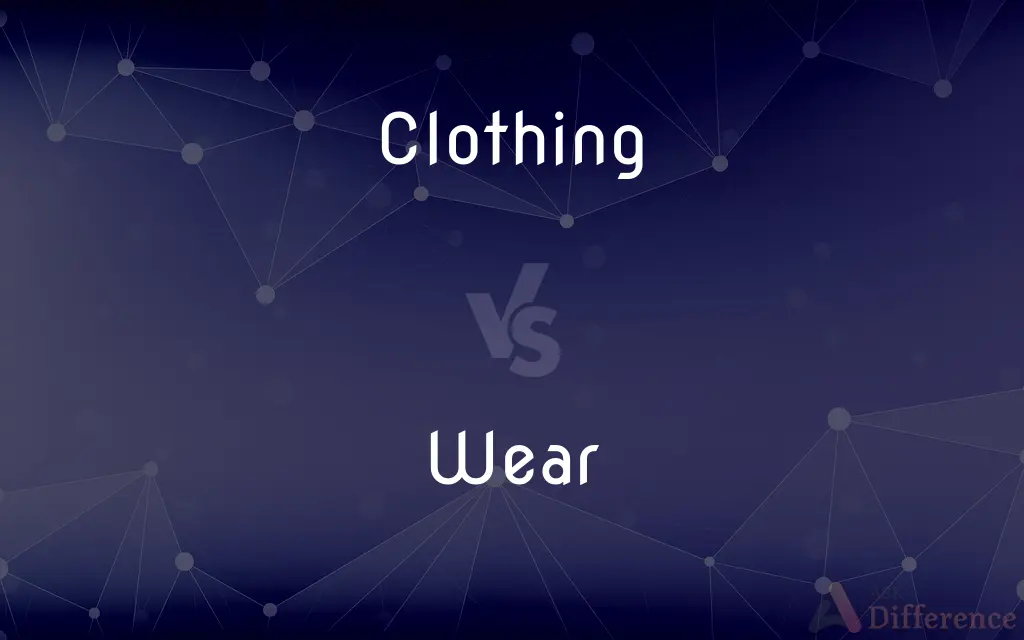Clothing vs. Wear — What's the Difference?

Difference Between Clothing and Wear
ADVERTISEMENT
Compare with Definitions
Clothing
Clothing (also known as clothes, apparel, and attire) are items worn on the body. Typically, clothing is made of fabrics or textiles, but over time it has included garments made from animal skin and other thin sheets of materials and natural products found in the environment, put together.
Wear
Wear is the damaging, gradual removal or deformation of material at solid surfaces. Causes of wear can be mechanical (e.g., erosion) or chemical (e.g., corrosion).
Clothing
Clothes considered as a group; wearing apparel.
Wear
To carry or have on one's person as covering, adornment, or protection
Wearing a jacket.
Must wear a seat belt.
Clothing
A covering.
ADVERTISEMENT
Wear
To carry or have habitually on one's person, especially as an aid
Wears glasses.
Clothing
Present participle of clothe
Wear
To display in one's appearance
Always wears a smile.
Clothing
Any of a wide variety of articles, usually made of fabrics, animal hair, animal skin, or some combination thereof, used to cover the human body for warmth, to preserve modesty, or for fashion.
You should wear warm clothing when it is cold outside.
All but two pieces of clothing came out of the washing machine stained.
A poncho is an item of clothing used by many people in Latin America.
A shirt is an article of clothing that covers the torso and arms.
Wear
To bear, carry, or maintain in a particular manner
Wears her hair long.
Clothing
An act or instance of putting clothes on.
The clothing and unclothing of the idols was of special significance.
Wear
To fly or display (colors). Used of a ship, jockey, or knight.
Clothing
(obsolete) The art or process of making cloth.
Wear
To damage, diminish, erode, or consume by long or hard use, attrition, or exposure. Often used with away, down, or off
Rocks worn away by the sea.
Shoes worn down at the heels.
Clothing
A covering of non-conducting material on the outside of a boiler, or steam chamber, to prevent radiation of heat.
Wear
To produce by constant use, attrition, or exposure
Eventually wore hollows in the stone steps.
Clothing
Garments in general; clothes; dress; raiment; covering.
From others he shall stand in need of nothing,Yet on his brothers shall depend for clothing.
As for me, . . . my clothing was sackloth.
Wear
To bring to a specified condition by long use or attrition
Wore the clothes to rags.
Pebbles worn smooth.
Clothing
The art of process of making cloth.
Instructing [refugees] in the art of clothing.
Wear
To fatigue, weary, or exhaust
Your incessant criticism has worn my patience.
Clothing
A covering of non-conducting material on the outside of a boiler, or steam chamber, to prevent radiation of heat.
Wear
(Nautical) To make (a sailing ship) come about with the wind aft.
Clothing
See Card clothing, under 3d Card.
Wear
To last under continual or hard use
A fabric that will wear.
Clothing
A covering designed to be worn on a person's body
Wear
To last through the passage of time
A friendship that wears well.
Wear
To break down or diminish through use or attrition
The rear tires began to wear.
Wear
To pass gradually or tediously
The hours wore on.
Wear
(Nautical) To come about with stern to windward.
Wear
The act of wearing or the state of being worn; use
This shirt is ideal for wear in sultry climates.
Wear
Clothing, especially of a particular kind or for a particular use. Often used in combination
Rainwear.
Footwear.
Wear
Damage resulting from use or age
The rug shows plenty of wear.
Wear
The ability to withstand impairment from use or attrition
The engine has plenty of wear left.
Wear
To carry or have equipped on or about one's body, as an item of clothing, equipment, decoration, etc.
He's wearing some nice pants today.
She wore her medals with pride.
Please wear your seatbelt.
Can you wear makeup and sunscreen at {{the same time?
}} He was wearing his lunch after tripping and falling into the buffet.
Wear
To have or carry on one's person habitually, consistently; or, to maintain in a particular fashion or manner.
He wears eyeglasses.
She wears her hair in braids.
Wear
To bear or display in one's aspect or appearance.
She wore a smile all day.
He walked out of the courtroom wearing an air of satisfaction.
Wear
To overcome one's reluctance and endure a (previously specified) situation.
I know you don't like working with him, but you'll just have to wear it.
Wear
To eat away at, erode, diminish, or consume gradually; to cause a gradual deterioration in; to produce (some change) through attrition, exposure, or constant use.
You're going to wear a hole in the bottom of those shoes.
The water has slowly worn a channel into these rocks.
Long illness had worn the bloom from her cheeks.
Exile had worn the man to a shadow.
Wear
To undergo gradual deterioration; become impaired; be reduced or consumed gradually due to any continued process, activity, or use.
The tiles were wearing thin due to years of children's feet.
Wear
To exhaust, fatigue, expend, or weary.
His neverending criticism has finally worn my patience.
Toil and care soon wear the spirit.
Our physical advantage allowed us to wear the other team out and win.
Wear
(intransitive) To last or remain durable under hard use or over time; to retain usefulness, value, or desirable qualities under any continued strain or long period of time; sometimes said of a person, regarding the quality of being easy or difficult to tolerate.
Don't worry, this fabric will wear. These pants will last you for years.
This color wears so well. I must have washed this sweater a thousand times.
I have to say, our friendship has worn pretty well.
It's hard to get to know him, but he wears well.
Wear
(in the phrase "wearing on (someone)") To cause annoyance, irritation, fatigue, or weariness near the point of an exhaustion of patience.
Her high pitched voice is really wearing on me lately.
Wear
To pass slowly, gradually or tediously.
Wear on, wear away.
As the years wore on, we seemed to have less and less in common.
Wear
(nautical) To bring (a sailing vessel) onto the other tack by bringing the wind around the stern (as opposed to tacking when the wind is brought around the bow); to come round on another tack by turning away from the wind. Also written "ware". Past: weared, or wore/worn.
Wear
To guard; watch; keep watch, especially from entry or invasion.
Wear
To defend; protect.
Wear
To ward off; prevent from approaching or entering; drive off; repel.
To wear the wolf from the sheep
Wear
To conduct or guide with care or caution, as into a fold or place of safety.
Wear
(uncountable) (in combination) clothing
Footwear; outdoor wear; maternity wear
Wear
(uncountable) damage to the appearance and/or strength of an item caused by use over time
Wear
(uncountable) fashion
Wear
Same as Weir.
Wear
The act of wearing, or the state of being worn; consumption by use; diminution by friction; as, the wear of a garment.
Wear
The thing worn; style of dress; the fashion.
Motley 's the only wear.
Wear
The result of wearing or use; consumption, diminution, or impairment due to use, friction, or the like; as, the wear of this coat has been good.
Wear
To cause to go about, as a vessel, by putting the helm up, instead of alee as in tacking, so that the vessel's bow is turned away from, and her stern is presented to, the wind, and, as she turns still farther, her sails fill on the other side; to veer.
Wear
To carry or bear upon the person; to bear upon one's self, as an article of clothing, decoration, warfare, bondage, etc.; to have appendant to one's body; to have on; as, to wear a coat; to wear a shackle.
What compass will you wear your farthingale?
On her white breast a sparkling cross she wore,Which Jews might kiss, and infidels adore.
Wear
To have or exhibit an appearance of, as an aspect or manner; to bear; as, she wears a smile on her countenance.
His innocent gestures wearA meaning half divine.
Wear
To use up by carrying or having upon one's self; hence, to consume by use; to waste; to use up; as, to wear clothes rapidly.
Wear
To impair, waste, or diminish, by continual attrition, scraping, percussion, on the like; to consume gradually; to cause to lower or disappear; to spend.
That wicked wight his days doth wear.
The waters wear the stones.
Wear
To cause or make by friction or wasting; as, to wear a channel; to wear a hole.
Wear
To form or shape by, or as by, attrition.
Trials wear us into a liking of what, possibly, in the first essay, displeased us.
Wear
To endure or suffer use; to last under employment; to bear the consequences of use, as waste, consumption, or attrition; as, a coat wears well or ill; - hence, sometimes applied to character, qualifications, etc.; as, a man wears well as an acquaintance.
Wear
To be wasted, consumed, or diminished, by being used; to suffer injury, loss, or extinction by use or time; to decay, or be spent, gradually.
Away, I say; time wears.
Thou wilt surely wear away, both thou and this people that is with thee.
His stock of money began to wear very low.
The family . . . wore out in the earlier part of the century.
Wear
Impairment resulting from long use;
The tires showed uneven wear
Wear
A covering designed to be worn on a person's body
Wear
The act of having on your person as a covering or adornment;
She bought it for everyday wear
Wear
Be dressed in;
She was wearing yellow that day
Wear
Have on one's person;
He wore a red ribbon
Bear a scar
Wear
Have in one's aspect; wear an expression of one's attitude or personality;
He always wears a smile
Wear
Deteriorate through use or stress;
The constant friction wore out the cloth
Wear
Have or show an appearance of;
Wear one's hair in a certain way
Wear
Last and be usable;
This dress wore well for almost ten years
Wear
Go to pieces;
The lawn mower finally broke
The gears wore out
The old chair finally fell apart completely
Wear
Exhaust or tire through overuse or great strain or stress;
We wore ourselves out on this hike
Wear
Put clothing on one's body;
What should I wear today?
He put on his best suit for the wedding
The princess donned a long blue dress
The queen assumed the stately robes
He got into his jeans
Share Your Discovery

Previous Comparison
Taxies vs. Taxis
Next Comparison
Patois vs. Argot














































